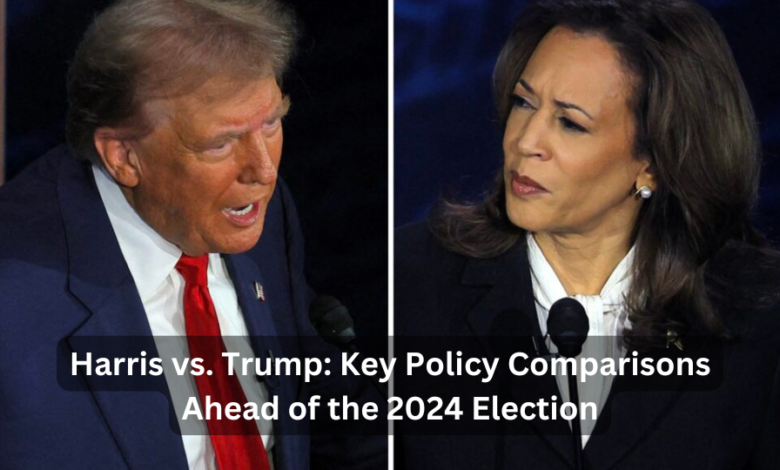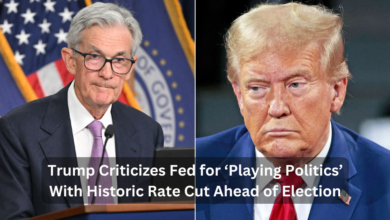Harris vs. Trump: Key Policy Comparisons Ahead of the 2024 Election

As American voters approach the 2024 presidential election, they face a stark choice between Democratic Vice-President Kamala Harris and Republican Donald Trump. Both candidates represent contrasting visions for the future of the United States, with significant differences in their approach to the economy, immigration, healthcare, and other key policy areas. This article provides a detailed comparison of their policies on major issues.
The Economy: Harris vs. Trump
Harris’ Economic Priorities
Kamala Harris has made the reduction of food and housing costs for working families a central plank of her economic platform. On her first day as president, she has promised to ban price-gouging on groceries and introduce measures to help first-time homebuyers. Harris’ policy focuses on increasing housing supply by offering incentives for new construction. These proposals aim to address the affordability crisis that continues to plague many parts of the country.
Harris also advocates for higher taxes on the wealthy and large corporations, including raising taxes on individuals earning over $400,000 annually. Her plan also includes expanding the child tax credits, which could ease financial pressures on working families.
Trump’s Economic Vision
Donald Trump, on the other hand, frames his economic message around bringing back affordability, stating that he will “end inflation and make America affordable again.” However, his proposals involve lowering interest rates, a policy lever typically controlled by the Federal Reserve, not the president. Trump’s plan to tackle housing affordability centers on deporting undocumented immigrants, which he claims will ease pressure on housing availability. He has also pledged to cut taxes, including an extension of his 2017 tax cuts, which primarily benefited wealthier Americans.
While Trump promises that his tax cuts will boost economic growth, many analysts argue that they could further increase the national deficit.
Abortion: A Divisive Issue
Harris’ Stance on Abortion Rights
One of the most contentious issues in the campaign is abortion. Kamala Harris has placed reproductive rights at the heart of her campaign, promising to pass legislation that will enshrine abortion rights across the nation. Following the Supreme Court’s decision to overturn Roe v. Wade in 2022, Harris has maintained that protecting access to abortion is a fundamental right that should be federally guaranteed.
Trump’s Evolving Position on Abortion
Donald Trump has struggled to maintain a consistent position on abortion during this campaign. While he appointed three conservative justices to the Supreme Court, which ultimately led to the reversal of Roe v. Wade, he has recently avoided taking a firm stance. His previous support for state-level restrictions on abortion remains a key part of his legacy, but it’s unclear what specific policies he would pursue if re-elected.
Immigration: Contrasting Approaches
Harris’ Immigration Policies
As vice president, Harris was tasked with addressing the root causes of migration from Central America. She helped raise billions of dollars in private investments aimed at stabilizing the region to stem the flow of migrants. Despite record-high numbers of people crossing the southern border in 2023, these numbers have declined recently.
On the campaign trail, Harris has emphasized her tough stance on human trafficking and her experience as a former prosecutor in California. She has also proposed more comprehensive immigration reform that would include a pathway to citizenship for certain undocumented immigrants.
Trump’s Plan for the Border
Donald Trump has made immigration a key issue in his campaign, vowing to complete the construction of the southern border wall and increase enforcement. He promises the largest mass deportation in U.S. history, targeting over a million undocumented immigrants. Trump’s proposed immigration measures have drawn sharp criticism, with legal experts noting that his mass deportation plan would likely face significant legal and logistical challenges.
In addition, Trump has urged Republicans to reject a bipartisan immigration bill supported by Harris. His stance on immigration remains a cornerstone of his platform, as he continues to campaign on reducing unauthorized migration.
Taxes and the Deficit
Harris’ Tax Plans
Kamala Harris advocates for a more progressive tax system. Her policies include raising taxes on corporations and high-income individuals while extending tax benefits to middle- and lower-income families. She has also emphasized providing tax relief through child tax credits and other measures aimed at helping working families.
Trump’s Tax Cut Strategy
Donald Trump proposes extending his 2017 tax cuts, which benefited high-income earners and businesses. His approach focuses on fueling economic growth through tax reductions and imposing tariffs on imports to protect American industries. However, economists warn that Trump’s tax policies could exacerbate the already burgeoning national deficit.
While both candidates’ tax policies may contribute to the deficit, experts note that Trump’s proposals, especially his plans for substantial tax cuts, would likely lead to a more significant increase in the federal debt.
Foreign Policy: Divergent Worldviews
Harris’ Global Engagement
Kamala Harris has positioned herself as a champion of multilateralism and international cooperation. She has been a strong advocate for supporting Ukraine in its war against Russian aggression, pledging that the U.S. would back Ukraine “for as long as it takes.” Harris also emphasizes competition with China, vowing that America will lead in global technology and economic dominance throughout the 21st century.
On the issue of Israel and Palestine, Harris supports a two-state solution and has been vocal about seeking an end to the ongoing conflict in Gaza. Her foreign policy reflects continuity with the Biden administration’s approach, balancing engagement with a focus on diplomacy.
Trump’s Isolationist Approach
Donald Trump takes a more isolationist stance, advocating for the U.S. to pull back from international conflicts. He has stated that he could end the war in Ukraine in 24 hours through a negotiated settlement with Russia. Critics argue that this would embolden Russia and weaken Ukraine’s position in the conflict.
While Trump continues to position himself as a staunch supporter of Israel, he has not articulated clear plans for ending the conflict in Gaza. His foreign policy overall seeks to disentangle the U.S. from international commitments and focus more on domestic priorities.
Trade Policies: Tariffs and Global Competition
Harris on Trade
Harris has criticized Trump’s trade policies, particularly his use of sweeping tariffs, which she argues function as a national tax on American consumers. Harris prefers a more targeted approach to tariffs, focusing on strategic competition with countries like China without broadly taxing all imports.
Trump’s Tariff-Centric Trade Strategy
For Donald Trump, tariffs are a central part of his economic strategy. He has proposed new tariffs ranging from 10-20% on most foreign goods, with even steeper tariffs on Chinese products. Trump argues that these tariffs would protect American industries from foreign competition, but economists warn that the costs may be passed down to consumers.
Climate Change: Diverging Views on Environmental Protection
Harris’ Environmental Initiatives
As vice president, Harris played a key role in passing the Inflation Reduction Act, which allocated billions of dollars toward renewable energy and electric vehicle tax credits. Although she initially opposed fracking, Harris has softened her stance to reflect political realities. Her campaign promises continued investment in clean energy technologies and climate mitigation efforts.
Trump’s Deregulation Agenda
During his time in office, Donald Trump rolled back many environmental regulations, including limits on carbon emissions from power plants and vehicles. Trump’s campaign promises include expanding Arctic drilling and rolling back further restrictions on the fossil fuel industry. He has also criticized electric vehicles and other green technologies, favoring a return to more traditional energy sources.
Healthcare: A Major Policy Divide
Harris’ Healthcare Agenda
Kamala Harris is committed to expanding access to healthcare. As part of the Biden administration, she helped reduce prescription drug costs and cap insulin prices at $35. Harris supports strengthening the Affordable Care Act (ACA) and expanding its coverage to more Americans.
Trump’s Healthcare Plans
Donald Trump has indicated that he will no longer pursue efforts to dismantle the ACA, which he attempted to repeal during his presidency. However, his proposals for healthcare reform remain vague. Trump has suggested providing taxpayer-funded fertility treatments, though this may face opposition within his own party.
Crime and Public Safety
Harris’ Record as a Prosecutor
Kamala Harris has highlighted her experience as a prosecutor, contrasting her career with Donald Trump, who has faced criminal convictions. Harris emphasizes criminal justice reform, focusing on rehabilitation and reducing recidivism, while maintaining a tough stance on human trafficking and drug-related crimes.
Trump’s “Law and Order” Campaign
Donald Trump promises to “crush” violent gangs, demolish drug cartels, and revitalize cities he claims are overrun with crime. His emphasis on “law and order” is central to his campaign, echoing themes from his previous elections, where he focused on combating urban crime and bolstering police forces.
Conclusion: A Choice Between Contrasting Visions
As voters prepare to make their decision, they face two starkly different visions for America’s future. Kamala Harris emphasizes social justice, environmental protection, and economic support for working families. Donald Trump, in contrast, offers an agenda of deregulation, tax cuts, and hardline immigration enforcement. Ultimately, the 2024 election will determine which path the nation will follow in the years to come.




